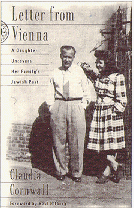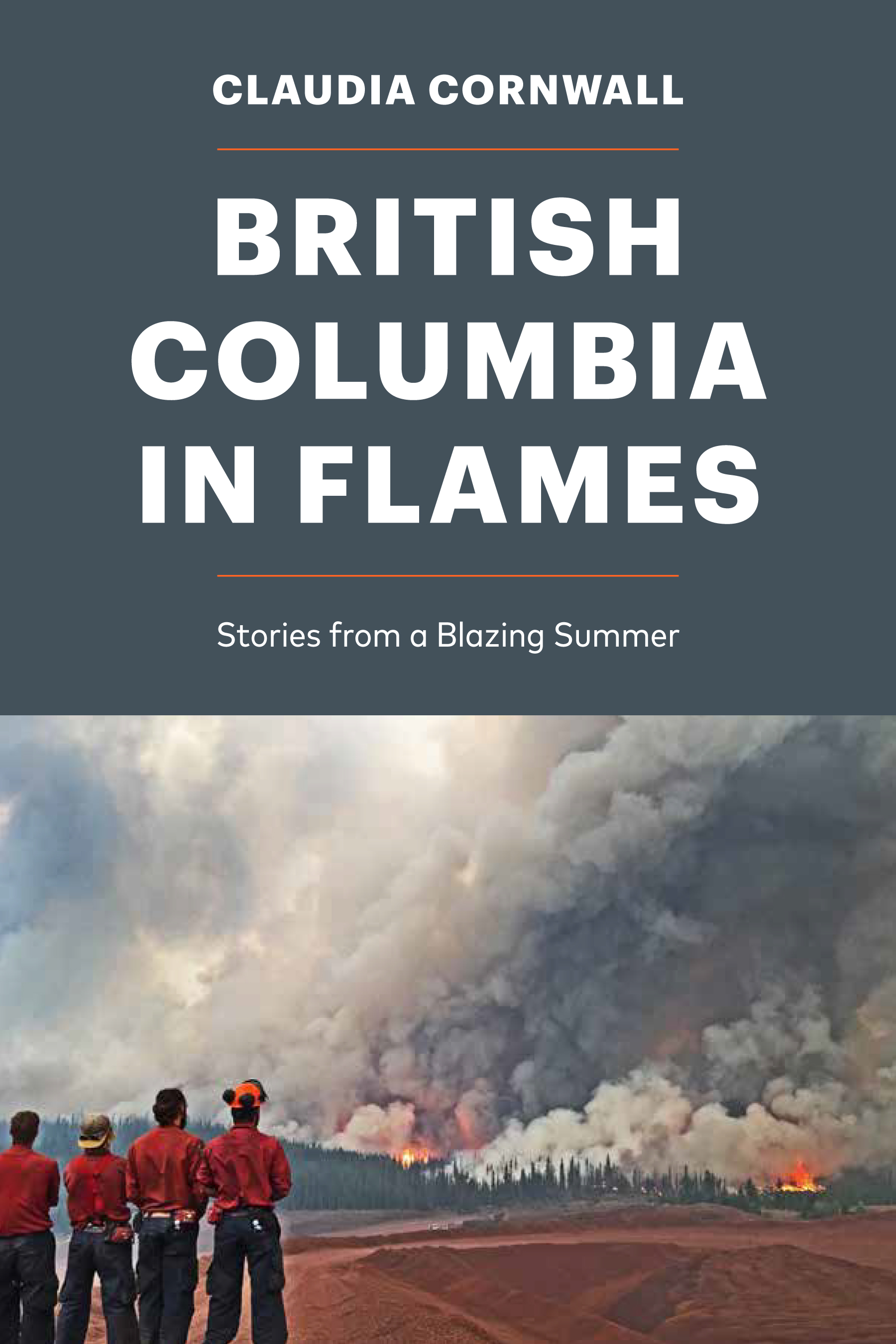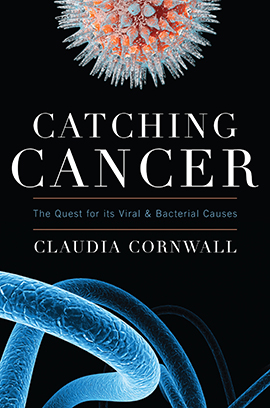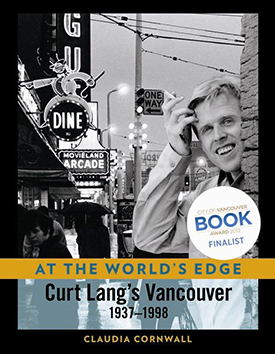Letter from Vienna: A Daughter Uncovers Her Family’s Jewish Past
 (Douglas & McIntyre, 1997)
(Douglas & McIntyre, 1997)
Foreword by Raul Hilberg
Winner of the 1996 British Columbia Book Prize for Nonfiction!
Find an independent bookseller
Reviews
“Few are the examples of such delving into personal history, and rare is such a crystalline account. I read the story with suspense, from the first page to the last.”
– RAUL HILBERG, author of The Destruction of the European Jews
“Claudia Cornwall takes us on a gripping journey into her family’s buried past. Her determined exploration of their hidden Jewish identity sheds new light on the Holocaust and its consequences, fifty years after the fact.”
– ERNA PARIS, author of Unhealed Wounds: France and the Klaus Barbie Affair
“Letter from Vienna is a precise depiction of a family facing the Holocaust. It is a sensitive report that teaches us a lesson from the past–so that we might yet be able to do something to make our future better.”
– ANNA E. ROSMUS, author whose books inspired the filmThe Nasty Girl
Excerpt: The Christmas Card
A woman with thick white hair and grey-green eyes is sitting at a white desk in a white room holding a white phone. Her skin is pale, the translucent ivory of a former redhead. This is my mother. I am at the other end of the line, a dark curly-haired woman with the same grey-green eyes. I am sitting on a blond cane chair in front of a bookshelf, holding a red phone. It is January 1989.
“Did you know?” I ask. I expect her to say that she did not.
“Yes,” she answers instead.
“Why didn’t you tell me?”
“If I have to choose between my loyalty to Daddy and my loyalty to you, Daddy comes first,” my mother explains. “He never wants to talk about it. But now the Pandora’s box is open.”
I am calling because of a Christmas card I received the day before from my Uncle GŸnther in Vienna. On the front was a photograph taken in the Tyrolese Alps showing a church and snow and sunshine. When I opened the card, I found another photograph inside. This one was of my father at about the age of four. He was standing in a garden between two women, holding their hands. He gazed straight at the camera with a solemn expression.
I took the picture out of the card and laid it down, thinking I would frame it and hang it on my bedroom wall. Then I began to read my uncle’s message. Writing in English, he opened with warm wishes and news about his family. There was nothing in his friendly tone or his remarks to prepare me for one sentence in the middle of his note. He offered it without explanation or comment. Then he went on to express the hope that our two families would meet in Austria for a holiday soon. He told me that a pacemaker implanted in my aunt’s heart made her feel much better and sent us all his love and many kisses.
I stared back at the photograph. Again I saw three people in a garden nearly eighty years ago. One of the women was crouching. She wore a dark dress and a starched apron. On her lap were three picture books. The other woman stood. Around her shoulders was a printed shawl. Her dress was dark too, but the apron covering it was not so crisp. She smiled. I noticed the sunflowers, already tall but without their heads. The time was probably midsummer. As my father was born in July, perhaps the occasion was his birthday and the books I saw, were presents.
I returned to the note. My uncle’s rivetting sentence was only twelve words long. He had written, “The lady standing up was our mother, who died in concentration camp.” I had never heard about this. Ever.
Copyright © 1995 by Claudia Cornwall
More Comments and Reviews
“Claudia Cornwall’s parents had hidden their secret in abandoned memories and closed trunks filled with yellowing letters. Letter from Vienna unravels that mystery. It is the tragic story of assimilated Jews who had failed to hide their heritage from the Nazis and now, having survived the Holocaust, hoped to hide their heritage from their children.”
– JAMES R. ROSS, author of Escape to Shanghai: A Jewish Community in China
“For Jews, life on this planet is often a succession of cliff edges to which they cling by nothing more than their fingertips. The author’s parents and grandparents exemplify the combination of will and wits that raises oppressed humans from the category of ‘victims’ to that of ‘victors.’ Claudia Cornwall’s insightfulness is matched by sensitive, crystal-clear writing.”
– MORLEY TORGOV, author of The Outside Chance of Maximilian Glick
“If Claudia Cornwall is a scholar, she is also an eloquent writer. Letter from Vienna is a beautifully composed book–in structure and in tone. Cornwall weaves a volume out of the strands of family stories, letters poems, conversation and diary entries–her own and those of others. Always, though, she brings the reader back, figuratively, from Shanghai or Vienna to touch base with Vancouver, her parents’ new world and her reality, her place in the world; Vancouver with its drizzle and its white-capped maountains in the near distance. There is a delicacy in her touch and despite the bewilderment and pain that she experiences, tolerance and tenderness
– SUSAN PERREN, in The Globe & Mail, Saturday, April 8, 1995
“Letter from Vienna does not find the answer to all of Cornwall’s questions–her identity remains a bit of a mystery to her and us…But the reader stays with her. Together, we feel what her father represses–the frenzied terror of the hunted refugee, the nausea of a world that offers no stability. And his past pervades our present. Around the globe today, millions seek that elusive safe sanctuary. I cannot think of a book that creates more empathy for the courage and misery of the world’s refugees.”
– SUZANNE KELMAN, in The Toronto Star, April 15, 1995




Tel Aviv, April 18, 2014
Dear Claudia,
I have just returned from a visit to Shanghai, and have read, for the second time, your “Letter to Vienna”. The first read was back in 1996, after you had received the prize for it, and I saw it at the beautiful Vancouver Library (while on a visit there).
Your research fascinated me then, as well as now, and I admit to “jealousy” for your talent, not only to do so much sleuthing and collecting of data, but your ability to weave all the strands into a fascinating fabric on which history played the title role.
I am also a researcher, and in past years have delved into fascinating family history (completely different, however) and can appreciate the amount of work, along with a huge labour of love in order to produce the book!
If you haven’t been yet to Shanghai, and seen the “Jewish aspect” I can highly recommend the tour that I attended there.
By the way, I am from Israel.
Thank you again,
Leorah